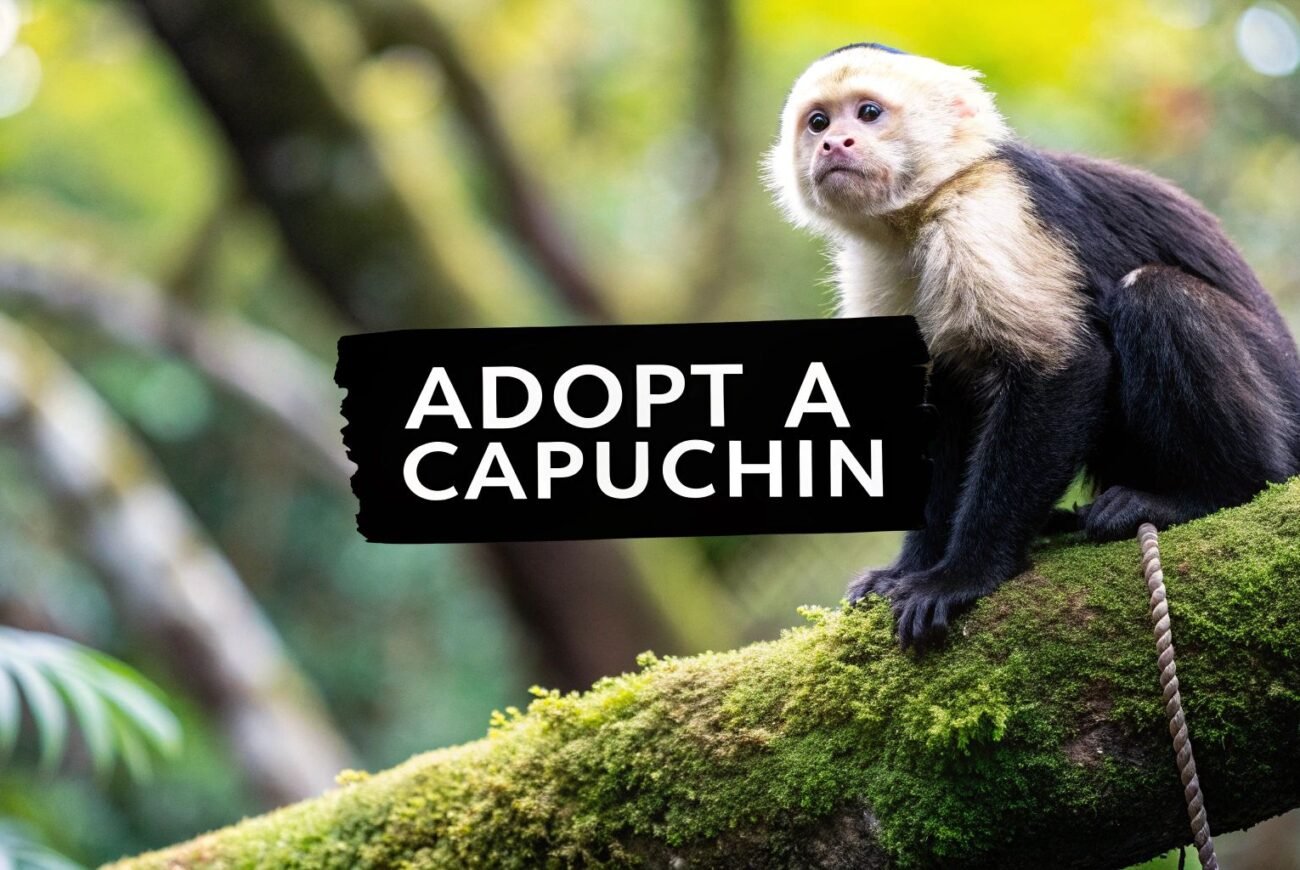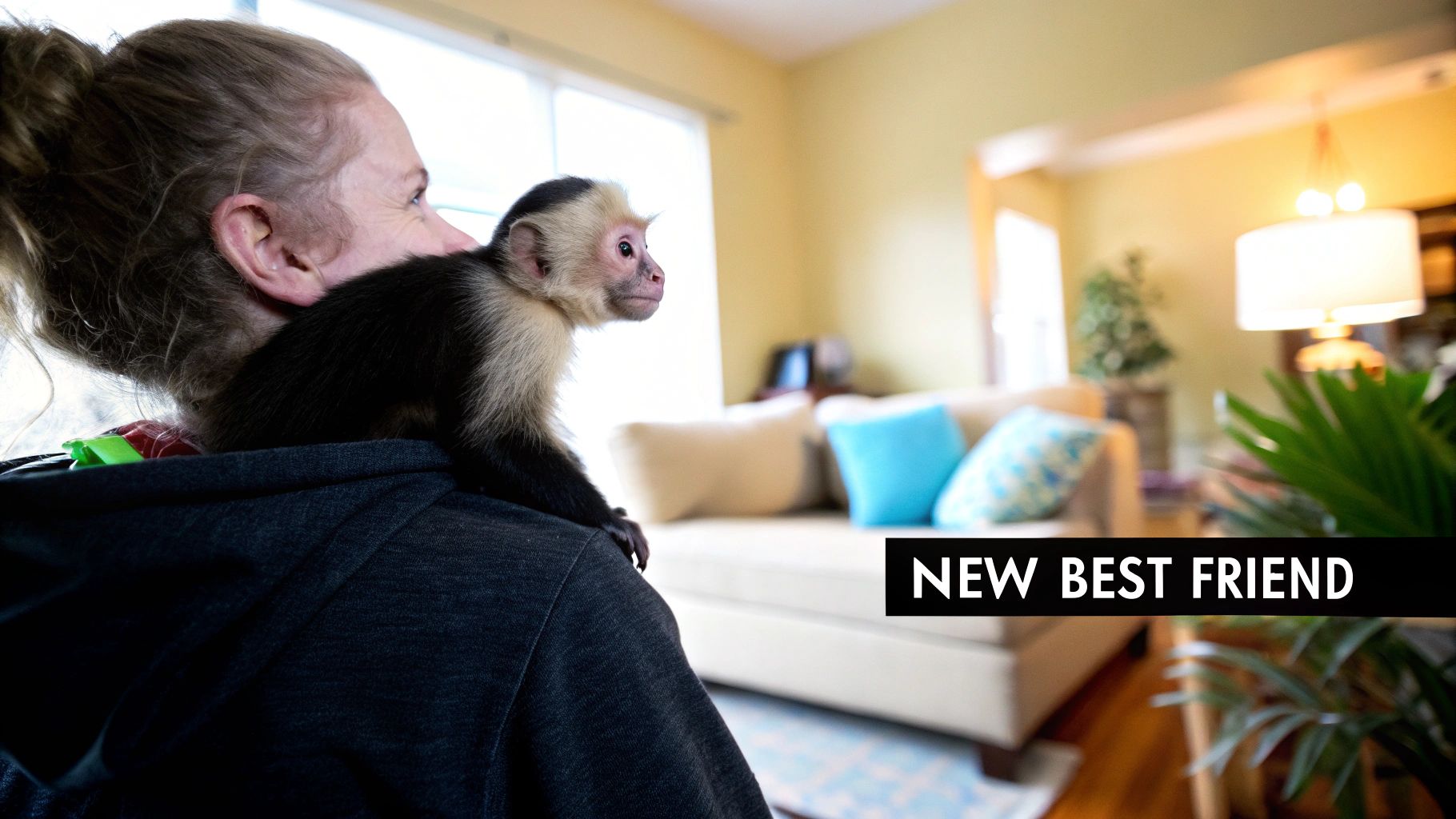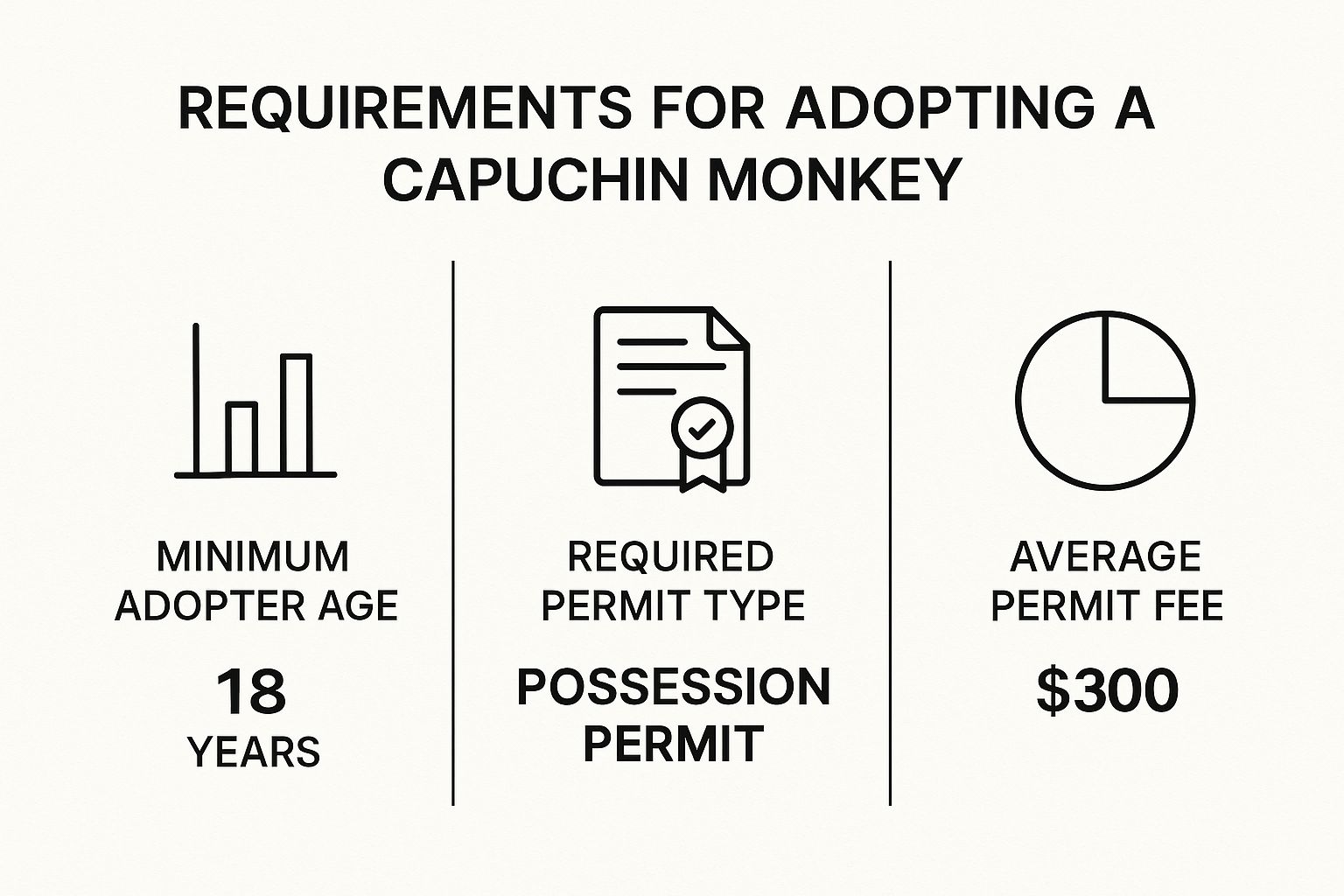
Adopt a Capuchin Monkey – Support Conservation Efforts Today
The Remarkable World of Capuchin Monkeys

Capuchin monkeys are undeniably fascinating. Their intelligence, adaptability, and complex social interactions have made them a popular subject of study. Found throughout Central and South America, these primates have intrigued researchers for decades. Their problem-solving abilities, often compared to those of young children, highlight their cognitive prowess. This intelligence isn't limited to individual skills; it plays a key role in their rich social lives.
Capuchin Habitats and Physical Characteristics
Capuchin monkeys thrive in the diverse landscapes of Central and South America. Their range extends from Argentina to Costa Rica, encompassing forested regions in countries like Brazil, Honduras, Paraguay, and Peru. Within these areas, capuchins primarily inhabit tropical rainforests and mountain forests, using the available resources for food and shelter.
Their prehensile tails, as long as their bodies (30 to 56 cm), are crucial for navigating the trees. Acting like a fifth limb, these tails allow them to swing between branches and reach fruit. They typically weigh between 1.4 and 4 kg and can live up to 25 years in the wild. In captivity, their lifespan increases to 35-40 years. Learn more about capuchin monkeys' characteristics here: Capuchin Monkey
Intelligence and Tool Use
A striking aspect of capuchin behavior is their tool use. They've been observed using rocks to crack open nuts and shells, demonstrating an understanding of cause and effect. This ability isn't instinctive; it's learned and passed down through generations. This learned behavior highlights a form of cultural transmission within capuchin communities.
Their intelligence goes beyond tool use. They display complex social behaviors, including communication through vocalizations, facial expressions, and body language. This sophisticated communication facilitates cooperation within their social groups, vital for hunting, foraging, and defense.
The Importance of Social Structures
Capuchins live in groups called troops, ranging from a few individuals to over twenty. These troops have complex social hierarchies and strong bonds between members. They also develop unique cultural practices, from specialized hunting techniques to grooming rituals, passed down through generations.
This intricate social structure makes capuchins vulnerable to the pet trade. Removing a capuchin from its troop causes significant psychological distress. Preserving these social structures in their natural habitats and responsible sanctuaries is crucial for their well-being. Their role as seed dispersers, contributing to forest regeneration, further emphasizes the need to protect them and their environment.
Why You Should Adopt a Capuchin Monkey (The Right Way)

The infographic above illustrates the legal requirements for adopting a capuchin monkey. It covers key aspects like minimum age, necessary permits, and the average associated fees. Clearly, bringing a capuchin monkey into your home—even where legally possible—can be a complicated and expensive process. This raises an important point: there's a big difference between simply wanting a capuchin monkey and genuinely caring for its well-being. We believe symbolic adoption offers a better way to support these intelligent creatures, avoiding the ethical and logistical complexities of private ownership.
The Ethical Considerations of Capuchin Ownership
Capuchin monkeys, with their engaging personalities and expressive faces, might seem like ideal pets. However, a typical home environment simply cannot meet their complex needs. Capuchins require specialized diets, large enclosures that replicate their natural habitat, and—most importantly—social interaction with other capuchins. Depriving them of these necessities causes considerable physical and psychological distress. For this reason, we strongly encourage exploring ethical alternatives like symbolic adoption.
The Power of Symbolic Adoption
Symbolic adoption provides a meaningful way to connect with these amazing animals while directly contributing to their survival. It means supporting organizations working to rescue, rehabilitate, and protect capuchins in the wild and in sanctuaries. For instance, symbolically adopting a capuchin through organizations like Wild Futures or the World Wildlife Fund (WWF) directly funds conservation and welfare initiatives for primates at risk. These programs are vital, supporting everything from rescuing monkeys from the illegal pet trade to preserving their natural habitats.
Shopify can be a valuable tool for organizations raising funds for conservation through online merchandise stores. Through symbolic adoption, you aren't just helping one monkey; you're contributing to the long-term survival of an entire species.
Making a Tangible Difference Through Adoption
Your symbolic adoption creates a ripple effect, going far beyond the individual capuchin whose story resonated with you. Wild Futures educates over 30,000 people annually about primate welfare and sustainable living. They also care for primates rescued from the pet trade and those displaced by deforestation. The UK alone has approximately 5,000 privately owned primates, many living in unsuitable conditions. With over 43 primate species critically endangered, this type of support is more important than ever. Symbolic adoption combines emotional connection with real-world impact, making it a crucial element of global capuchin conservation.
To further clarify the differences between symbolic adoption and physical ownership, let's look at a comparison table:
Symbolic Adoption vs. Physical Ownership
This table compares the differences between symbolically adopting a capuchin monkey through a conservation organization and attempting to keep one as a pet.
| Aspect | Symbolic Adoption | Physical Ownership |
|---|---|---|
| Cost | Relatively low annual fee | High initial cost and ongoing expenses (food, enclosure, vet care) |
| Legal Requirements | None | Complex permits and regulations, often difficult to obtain |
| Ethical Considerations | Supports conservation and welfare | Raises ethical concerns regarding primate well-being in captivity |
| Impact | Contributes to species survival and habitat preservation | Potential for negative impact on individual animal welfare |
| Space Requirements | None | Requires a large, specialized enclosure |
| Social Interaction | Monkey remains in its natural social group | Difficult to provide adequate social interaction, leading to potential psychological distress |
This table highlights the key advantages of symbolic adoption. It allows individuals to support capuchin conservation without the significant financial burden, legal hurdles, and ethical concerns associated with private ownership. It prioritizes the well-being of the animals while still allowing for a meaningful connection with the species.
Inside Capuchin Communities: Sophisticated Social Lives

Capuchin monkeys are renowned for their intelligence. However, they are also highly social animals with complex community structures. These intricate social lives are just as fascinating as their individual smarts, playing a significant role in their behaviors and survival. Let's explore the captivating dynamics of capuchin society, focusing on communication, cultural practices, and the detrimental effects of social disruption.
Communication: A Symphony of Signals
Capuchins communicate through an intricate combination of vocalizations, facial expressions, and body language. These signals are key to cooperation within the group. Specific calls can warn the troop about predators or announce the discovery of food.
This advanced communication is essential for coordinating group activities like hunting and foraging. Furthermore, subtle changes in posture or facial expression communicate emotions and reinforce social bonds. These intricate interactions are the foundation of cohesive capuchin communities.
Cultural Practices: Passed Down Through Generations
Capuchin groups go beyond basic communication. They develop unique cultural practices passed down through generations. These traditions can include specialized hunting methods and distinctive grooming rituals. This knowledge transfer is similar to how human families pass down traditions.
This cultural inheritance equips younger generations with important skills and knowledge. It allows them to adapt to their environment and maintain group cohesion. These practices highlight the depth and complexity of capuchin social learning.
Capuchin monkeys have even been observed developing cultural fads in the wild. Over a 15-month period, five young male capuchins developed the unusual habit of abducting howler monkey infants. Researchers documented them carrying 11 different howler babies, sometimes for up to nine days. Spread through social learning, this behavior became a cultural fad, much like killer whales wearing salmon on their heads or chimpanzees using grass as accessories. Learn more about this intriguing behavior: Capuchin Monkeys and Howler Infants
The Importance of Social Bonds
Social connections within a capuchin troop are vital for their well-being. Removing a capuchin from its social group, a common occurrence in the pet trade, causes severe psychological trauma, comparable to solitary confinement in humans. This isolation can have devastating consequences for their mental and physical health.
Therefore, protecting these social structures is a crucial part of capuchin conservation. Conservation efforts must go beyond safeguarding individual capuchins; they must protect the entire social fabric. This emphasizes the importance of ethical adoption programs that prioritize the social needs of these primates. By understanding and respecting their intricate social lives, we can significantly contribute to their survival and well-being.
How to Adopt a Capuchin: Finding Legitimate Programs
Adopting a capuchin monkey the right way means prioritizing their well-being and supporting ethical conservation. This involves finding legitimate programs that focus on the species' long-term survival.
Identifying Truly Impactful Programs
While many organizations offer "adoption" programs, it's essential to understand the differences. We strongly discourage hands-on pet ownership of capuchins. Instead, look for symbolic adoptions, which fund vital conservation work. The most impactful programs emphasize rescue, rehabilitation, and habitat preservation. Some organizations specialize in rescuing capuchins from the illegal pet trade, while others concentrate on protecting their natural habitats.
Key Questions to Ask Before You Adopt
Transparency is crucial when choosing an adoption program. Before committing, ask key questions about their operations. Do they openly share fund allocation reports, detailing how your donation will be used? What is their sanctuary accreditation status? Accreditation from reputable organizations like the Global Federation of Animal Sanctuaries ensures high standards of animal care. Finally, research the organization's history, looking for documented conservation achievements and the number of capuchins they've rescued. This demonstrates tangible impact.
What a Meaningful Adoption Package Includes
A genuine adoption package goes beyond a simple certificate. Look for programs that provide personalized updates on your chosen capuchin, including photos and stories of their progress. Educational materials about capuchins and their conservation status are also important. This helps you connect with the species and understand the broader impact of your support.
Tax Benefits and Renewal Options
Many legitimate adoption programs are affiliated with non-profit organizations, offering potential tax benefits. Confirm the tax deductibility of your donation with the specific organization. Understanding renewal options is also helpful. While some adoptions are one-time gifts, others offer annual renewals. Gifting a symbolic adoption is a unique way to share your passion for wildlife conservation.
Top Organizations for Capuchin Monkey Adoption
To help you begin your search, the table below provides information about several reputable organizations:
Top Organizations for Capuchin Monkey Adoption
| Organization | Program Type | Cost Range | What's Included | Impact Focus |
|---|---|---|---|---|
| Wildlife Conservation Society | Symbolic Adoption | $50-$100 | Personalized certificate, species information, conservation updates | Habitat Preservation |
| World Wildlife Fund | Symbolic Adoption | $25-$75 | e-newsletter, annual report, online resources | Species Conservation |
| Rainforest Alliance | Symbolic Adoption | $100-$500 | Conservation project updates, adoption kit, membership benefits | Rainforest Protection |
Remember to thoroughly research any organization before donating. Your adoption should support ethical and sustainable conservation efforts. By considering these factors, you can make a real difference in the lives of capuchin monkeys.
Transformation Stories: Your Adoption's Real Impact
Symbolically adopting a capuchin monkey isn't just a heartwarming act; it creates real, positive change. These adoptions lead to conservation wins, directly affecting the lives of capuchins and their vulnerable habitats. Consider Carlos, a capuchin rescued from an illegal pet owner's basement. Today, thanks to funding from adoption programs, Carlos flourishes as the leader of a social group in a spacious sanctuary.
From Cages to Community: Rescue and Rehabilitation
Carlos's journey showcases the impact of adoption programs on individual capuchins. Many rescued monkeys arrive at sanctuaries malnourished and traumatized by their experiences in the pet trade. Adoption funds provide critical resources for their rehabilitation.
- Specialized veterinary care
- Nutritious diets
- Enriching environments that mimic their natural habitats
This care allows the monkeys to heal and, like Carlos, rejoin social groups, a vital part of their well-being.
Protecting Wild Populations: Habitat Preservation and Anti-Poaching
The benefits of adoption programs extend beyond sanctuary care. Adoption contributions support crucial initiatives like the Protected Corridor Initiative in Costa Rica. This initiative links fragmented forest sections, allowing separated capuchin groups to reconnect and prosper. These corridors facilitate gene flow and strengthen the resilience of these groups.
Adoption funding also provides anti-poaching units with the necessary equipment and technology. This protection shields wild capuchins from the illegal pet trade and habitat destruction. When looking for reputable adoption programs, research and possibly collaborate with responsible animal care advocates or groups. Learning how to find microinfluencers can help connect you with the right people.
Empowering Communities: Education and Sustainable Practices
Adoption programs empower local communities to actively participate in capuchin conservation. These programs have funded community education programs, leading to a 78% reduction in hunting in some crucial areas. The initiatives teach communities about the importance of capuchin monkeys to the ecosystem and promote sustainable alternatives to hunting.
Measurable Outcomes: Real Change for Capuchin Monkeys
The impact of these combined efforts is quantifiable. From population growth in protected areas to the expansion of sanctuary facilities, symbolic adoptions directly contribute to positive developments. This demonstrates that individual contributions, when used effectively, create a collective force that can transform the future of capuchin monkeys. The success stories of rescued capuchins and the noticeable improvements in their wild habitats demonstrate the power of adoption programs. By supporting ethical adoption, you actively contribute to the survival of these incredible primates.
Beyond Adoption: Additional Ways to Make an Impact
Symbolically adopting a capuchin monkey is a powerful step towards conservation. However, there are other ways to contribute to the well-being of these intelligent primates, ranging from hands-on involvement to supporting sustainable practices.
Volunteer Opportunities: Direct Action for Capuchin Welfare
Consider volunteering at a primate sanctuary. These sanctuaries, located throughout the Americas, rely on dedicated volunteers with diverse skills. Whether your background is in construction, administration, or social media management, your contributions can directly benefit rescued capuchins.
Building or improving enclosures provides more comfortable and stimulating environments for the monkeys. Administrative support and social media promotion free up staff to focus on the animals' direct care.
Citizen Science: Contributing to Crucial Research
Contribute to vital research from anywhere in the world through citizen science initiatives. These programs allow anyone to participate in scientific projects, regardless of background.
Some projects involve analyzing audio recordings of capuchin vocalizations to help researchers understand their communication. Others might involve identifying capuchins in camera trap photos, helping scientists track populations and monitor behavior. These programs offer valuable insights into capuchin behavior, ecology, and conservation challenges.
Conscious Consumerism: Protecting Capuchin Habitats
Thoughtful purchasing decisions can significantly impact capuchin habitats. Choosing shade-grown coffee, for instance, helps protect the forest ecosystems where capuchins live. This farming method minimizes deforestation, preserving vital habitat for the monkeys and other wildlife.
Supporting sustainable tourism initiatives while traveling also helps preserve these delicate ecosystems. By being mindful of the products you buy and the destinations you visit, you can positively impact capuchin conservation.
Evaluating Engagement Opportunities: Making a Meaningful Difference
To maximize your impact, carefully evaluate different engagement opportunities. Consider the following:
- Transparency: Does the organization clearly explain how it uses its resources?
- Impact: Can the organization demonstrate measurable results from its work?
- Alignment With Your Values: Does the organization's mission resonate with your personal conservation goals?
Whether you are new to conservation or a seasoned advocate, various entry points exist to find the perfect fit for your interests and abilities. Creating a personalized conservation plan ensures your time and resources are used effectively. By exploring these avenues, you can amplify your contribution to capuchin monkey conservation beyond adoption, becoming a true advocate for these extraordinary creatures.

Start Your Capuchin Adoption Journey Today
Now is the time to make a difference for capuchin monkeys. Ethically adopting a capuchin isn't about bringing one home. It's about contributing to their well-being in the wild and in sanctuaries, joining a global network of conservationists.
The Ripple Effect of Your Adoption
Your adoption has a significant impact. It provides essential care for rescued capuchins, improving their daily lives. Your contribution also funds critical initiatives that protect entire wild populations.
The connection you develop, often through updates and photos from the organization you choose, creates a personal link to conservation. This fosters a lasting commitment, going far beyond a single donation.
Choose Reputable Organizations, Make a Real Difference
Begin today by selecting a reputable organization from a verified list. This ensures your support goes directly to those who need it most. It's incredibly rewarding to know your contribution helps these intelligent primates and their delicate ecosystems.
Your adoption strengthens the future for these remarkable animals and the environment they call home. Ready to start your adoption journey and support capuchin conservation? Visit Primate Pets to learn about the ways you can help these amazing animals.
Article created using Outrank




